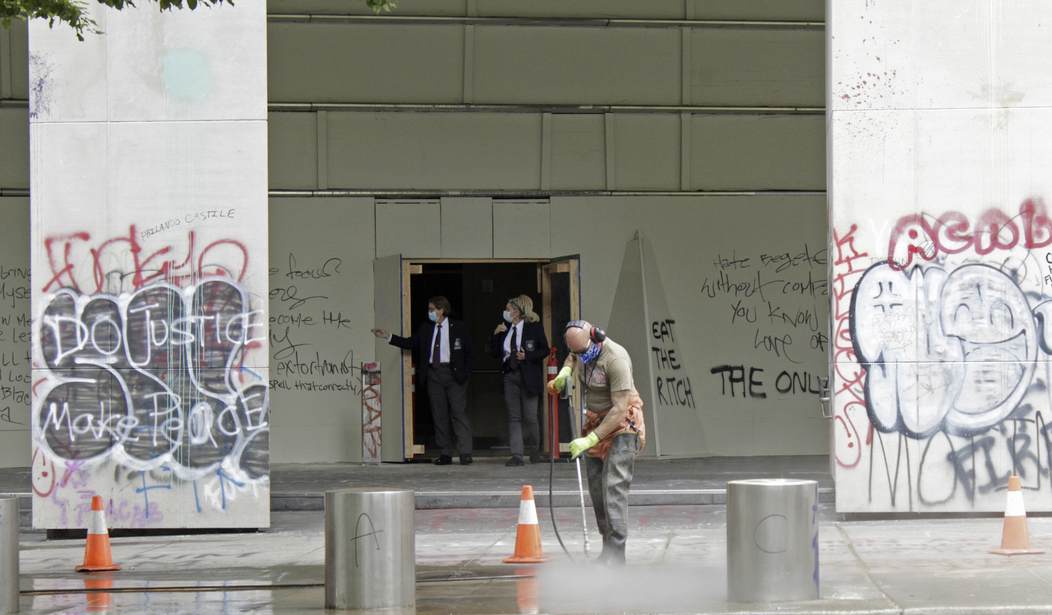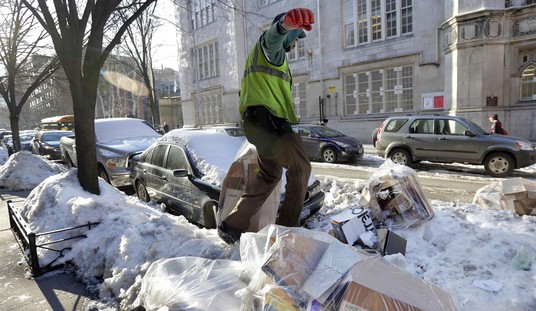“Every American should be repulsed when they see this happening. If this can happen here in Portland, it can happen anywhere.”
So spoke Oregon Attorney General Ellen Rosenblum on Friday. Taken alone, the statement is of course inarguable, but not for the reasons Rosenblum thinks. What civic plague is it that she finds so repulsive? What is it she fears will spread from the idyllic streets of Portland to the rest of the country? Not the rioting that for weeks has convulsed the city’s downtown, certainly. Nor is it the property damage and disruptions to the daily lives of those who live and work in the affected area that discomfits the state’s top law enforcement official. No, all of that is accepted, even welcomed, in the name of the progressive movement, of which Portland is vying with Seattle, San Francisco, and Minneapolis to be the capital. Rather, it is the efforts of federal law enforcement officials to accomplish what local authorities have been unable or unwilling to bring about: the restoration of order in the area near the city’s federal courthouse, where anarchists have run amok for 52 consecutive nights.
“Keep Portland weird” is the city’s unofficial motto, but it seems to be the controlling doctrine for not only the city’s elected officials but also the state’s. Portland mayor Ted Wheeler spoke at a press conference on Friday, directing some of his remarks to President Trump. “Keep your troops in your own buildings,” he said, “or have them leave our city.” And Oregon governor Kate Brown accused the president of instigating a confrontation with rioters in the hope of gaining electoral advantage in November.
I’ll be among the last to speculate on what motivates President Trump, but if he should derive any advantage from federal law enforcement efforts in Portland, so be it. Consider the role of a president – any president – as he watches a mob lay siege to a federal courthouse for six weeks with little discernable resistance from local law enforcement. How should the president – any president – respond to such a persistent affront to civil authority?
Mobs such as the one in Portland often recite among their tiresome chants, “This is what democracy looks like.” God help us if that’s true. What democracy really looks like, at least as it’s been practiced in the United States, can be found within the walls of the federal courthouse the Jacobins in Portland have sought to burn down. Indeed, it is the courthouse, more than a city hall or state legislative chamber, that best symbolizes how a civil society should function. Disputes among free people are bound to arise, and those that cannot be settled amicably between the parties are brought to court and adjudicated under the rule of law.
But not in Portland, aparently, where the mob is free to impose its will on a civic leadership whose members, if not fully allied with the mob, have been cowed into acquiescence to it.
Mayor Wheeler and others have made objections to some of the tactics employed by the federal agents now defending the courthouse, citing their use of unmarked cars and military-style uniforms. And, as is its wont, the ACLU has responded hysterically to the federal intervention. “Usually when we see people in unmarked cars forcibly grab someone off the street, we call it kidnapping,” said Jann Carson, interim executive director of the American Civil Liberties Union of Oregon. “The actions of the militarized federal officers are flat-out unconstitutional and will not go unanswered.”
There is nothing unconstitutional about the use of unmarked cars to make an arrest. I’ve spent a good portion of my police career wearing plain clothes and driving an unmarked car, and many are the people I’ve arrested while doing so. Nor is there any constitutional prohibition against federal agents wearing military-style uniforms, though my preference would be that the camouflage be left in the locker when operating in cities. Still, the arrests being made are the result of investigations based on surveillance and other intelligence-gathering techniques that led to the identification of some of the rioters, and it’s about time. It strikes me as odd that some people assume they can vandalize and even try to burn down a courthouse night after night for weeks without fear of any consequences. (Though given the fecklessness of the local authorities in Portland, perhaps this isn’t an unreasonable assumption after all.)
If the rioting in Portland and the federal response to it do redound to the president’s advantage, his opponents will have only themselves to blame for allowing the conditions to fester in the first place. Whether it’s political genius or some kind of primordial cunning I cannot say, but the president has demonstrated time and again his ability to make his opponents expose themselves in ways many voters find repellant. Among those stepping on the rake was – of course – Nancy Pelosi, who unwittingly proved Godwin’s law when she tweeted that the federal agents defending the courthouse in Portland were “stormtroopers” who “must be stopped.”
So now, and presumably until Election Day, the line is drawn between those who think rioters should be arrested and those content to see them continue their hooliganism unmolested. The president is on one side of that line, Nancy Pelosi is on the other. On November 3, where will the country stand?










Join the conversation as a VIP Member